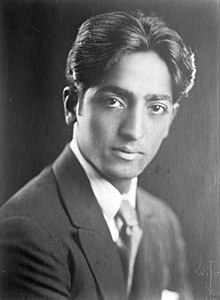
Back جدو كريشنامورتي Arabic جدو كريشنامورتى ARZ Ciddu Krişnamurti Azerbaijani جیدو کریشنامورتی AZB Jiddu Krishnamurti BAN Джиду Кришнамурти Bulgarian জিদ্দু কৃষ্ণমূর্তি Bengali/Bangla ཇེ་དུ་ཀྲི་ཤི་ན་མུར་ཏི། Tibetan Jiddu Krishnamurti BS Jiddu Krishnamurti Catalan
Jiddu Krishnamurti | |
|---|---|
 Krishnamurti in the 1920s | |
| Born | 12 May 1895 Madanapalle, Madras Presidency, British India |
| Died | 17 February 1986 (aged 90) Ojai, California, U.S. |
| Occupations |
|
| Notable work |
|
| Relatives | Jiddu Narayanaiah (father)
Jiddu Nityananda (brother) Annie Besant (adoptive parent) |
| Era | 20th-century philosophy |
| Region | |
| Institutions | Krishnamurti Foundation (founder) |
Jiddu Krishnamurti (/ˈdʒɪduː ˌkrɪʃnəˈmʊərti/ JID-oo KRISH-nə-MOOR-tee; 12 May 1895 – 17 February 1986) was an Indian philosopher, speaker, writer, and spiritual figure. Adopted by members of the Theosophical tradition as a child, he was raised to fill the advanced role of World Teacher, but in adulthood he rejected this mantle and distanced himself from the related religious movement. He spent the rest of his life speaking to groups and individuals around the world; many of these talks have been published. He also wrote many books, among them The First and Last Freedom (1954) and Commentaries on Living (1956–60). His last public talk was in January 1986, a month before his death at his home in Ojai, California.
Krishnamurti asserted that "truth is a pathless land" and advised against following any doctrine, discipline, teacher, guru, or authority, including himself.[1] He emphasized topics such as choiceless awareness, psychological inquiry, and freedom from religious, spiritual, and cultural conditioning. His supporters — working through non-profit foundations in India, Britain, and the United States — oversee several independent schools based on his views on education, and continue to distribute his thousands of talks, group and individual discussions, and writings in a variety of media formats and languages.
- ^ Rodrigues, Hillary (January 1996). "J. Krishnamurti's 'religious mind'". Religious Studies and Theology. 15 (1): 40–55.